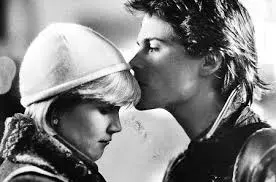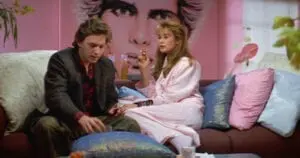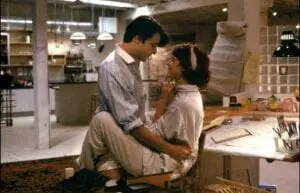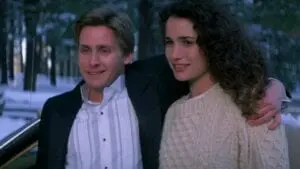St. Elmo's Fire
"The passion burns deep."
(1985)
starring Emilio Estevez, Rob Lowe, Andrew McCarthy, Demi Moore, Ally Sheedy and Mare Winningham
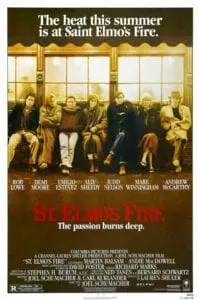
PODCAST:
'80s Movies: A Guide to What's Wrong with Your Parents -
ST. ELMO'S FIRE: A Historical Document of the Era's Off-Balance Values
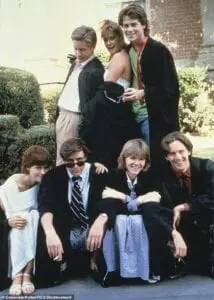
Why it’s rad:
- Who didn’t want friends this close?
- Who didn’t want their group of friends to have a catch-gesture? Boogda-Boogda-Boogda-ha-ha-ha!
- Drool-worthy interior design: Jules’ neon Billy Idol wall design, Alec and Leslie’s glass cube walls and giant photo wall art.
- That poignant score that is at times wistful, at times hopeful, at times regretful, and at times nostalgic.
- Jules and Billy. While both are train wrecks, they both the epitome of cool.
So '80s:
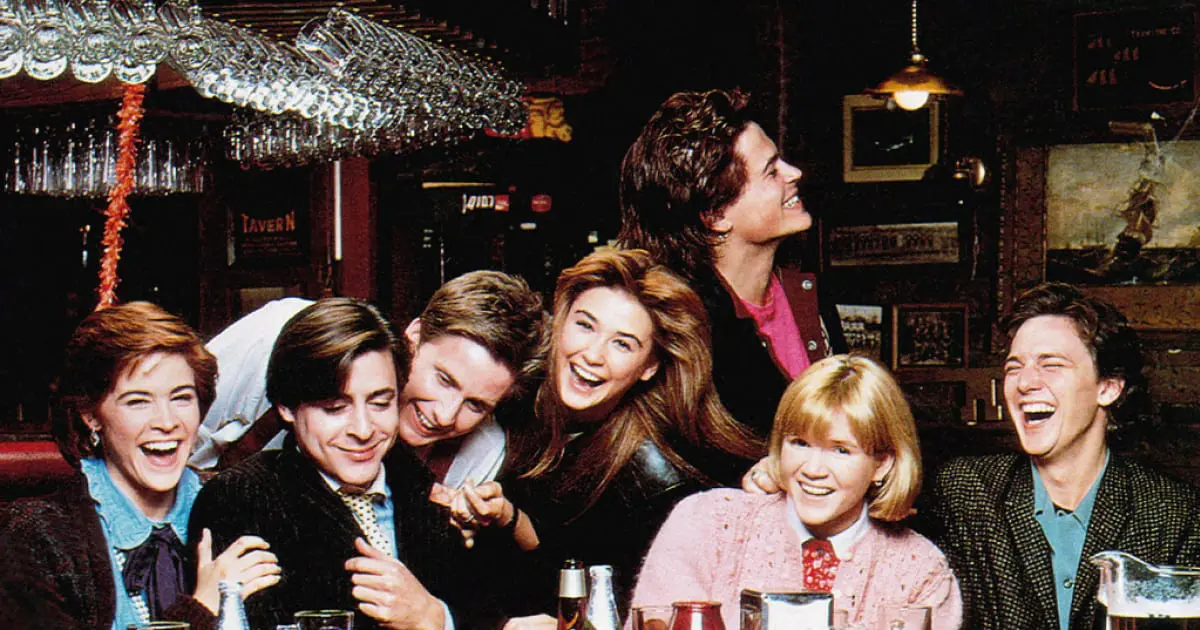
- It’s the Brat Pack, now out of high school!
- It starts to question the status quo, questioning if marriage is always the next step.
- Jules pink, white, black, neon and fabulous apartment, complete with Billy Idol on the wall.
- The beginning of pop culture awareness that people we know, people we like, one of our closest friends, may be gay.
- Jules’ career in investment banking was indicative of how young women were entering the workforce in more male dominated arenas.
- Billy plays the saxophone, the musical instrument the ‘80s deemed the sexiest.
Historical Perspective
Career first, marriage second was an emerging notion. The very idea that Wendy's father believes he needs to marry her off to a man of his choosing is shocking; the fact that he's trying to sweeten the deal with a Chrysler LeBaron is antithetic to our Western views of love, romance, and freedom. Meanwhile, Leslie's resistance to marrying Alec until she was established in her career was a uniquely Gen X point of view. "Marriage is obsolete," stated by Kevin, was bandied around but the notion hadn't made headway (that gained steam in the 2000s, but with the legalization of gay marriage in some states, marriage was essentially made trendy again). Putting the wedding on the back burner in the '80s made sense because divorce rates spiked in 1980's – 1981 to be exact. In 1985, it’s no surprise that young adults were wondering why, exactly, they should rush to get hitched if there was a 50-50 chance it would blow up in their face?
A consistent father is better than a weekend daddy. It's outrageous today that Billy would annul his marriage and cede all rights to his baby daughter so another man could step in and give them a better life. But, fathers didn’t have a lot of rights in the ‘80s. Also, child custody arrangements were not the norm, so it felt new and no one really knew the impact of divorce on the kids just yet. The belief at the time was an intact traditional family unit was most important for a child. Therefore, a new full-time stepdad was better than a weekend biological father.
What’s your damage?
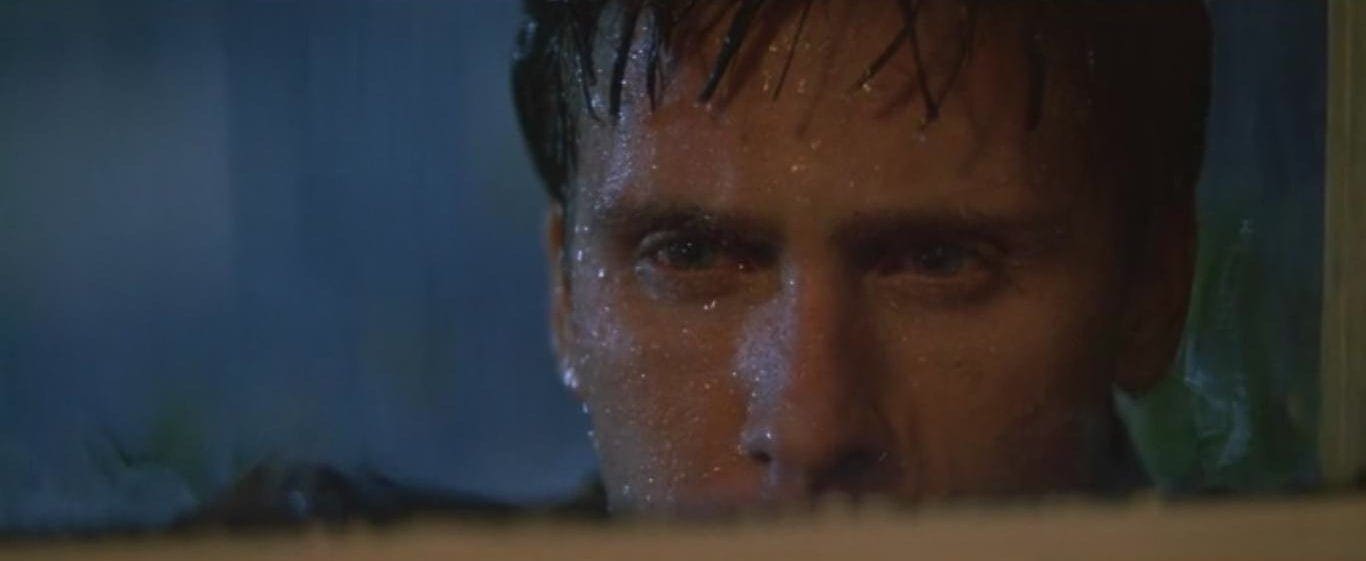
Drunk driving is funny. The opening scene introduces the friends at a hospital after drunk Billy crashes Wendy’s car. Once they see Wendy only suffered a cut to her forehead, the crew laughs it off and makes jokes – even Billy, as he’s being arrested for driving under the influence. Billy later describes the car crash as if it’s cool, almost poetic.
Cocaine is cool. Jules’ friends are so worried about her they stage an intervention…not about her cocaine habit, but because she’s sleeping with her boss. Also, as Jules is the most glamorous character, it promotes the message that the cool kids snort coke.
Stalking is sweet. Umm….Kirby is a stalker. Isn’t that adorable? He follows Dale Biberman (Andie McDowell) and becomes a Peeping Tom when he watches her through a window at party. At the scariest point in his obsession, he threatens Dale’s roommate (Jessica Hecht) to tell him where she’s staying on a ski vacation “because I’m not responsible for what I’ll do to you if you don’t.” When he arrives at the cabin, he pounds on the door demanding to see Dale, as if he owns her. Dale should feel some distress at being hunted, you'd think she'd make a quick run to the courthouse to get a restraining order. Instead, she and her boyfriend respond with kindness and understanding, and relays to the audience that Kirby’s persistence is sweet. She gives him an encouraging goodbye with a kiss on the cheek, which motivates Kirby to plant a big kiss on her.
A woman's sexual worth is in her weight and her wallet. While the other characters are getting after it at every turn, "fat" Wendy can only get a date with Howie. Howie is dorky and unappealing, but even Wendy doesn't think she can do better. She understandably crushes on the handsome "out of hand" Billy - her polar opposite. Her love for him doesn't wane even after he is married and has a baby, perhaps better to keep the fantasy because she has so few romantic options. She enables his self-destructive behavior with her trust fund. Billy takes advantage of Wendy’s love for him at every turn, and it feels like he hangs around for her bucks to bail him out. Just before Billy takes the train to New York, he asks Wendy to give him her virginity. As if he’s doing her a favor. Of course, she sleeps with him and the scene is made to be beautiful. So, to be clear, Wendy wasn’t worth sleeping with during the four of five years they’ve known each other – only presented as a mercy f—k, as a sort of gift from him to her. Then he leaves town, saying goodbye with A KISS ON THE FOREHEAD, which, of course, is the least romantic, least passionate kiss you can receive.
In the 1980s, a size 8 was fat. By the way, Wendy is not fat. Mare Winningham was put in padding but she's still an 8 or 10, at best. Thin was in during the '80s.
Attempted sexual assault shouldn't come between friends. Wendy isn't the only friend who enables Billy, so does Jules. It’s clear Billy and Jules used to be involved, but that’s over and Billy has a family now. Still, Jules regularly kisses and flirts with him. And that leads to the very worst offense of this film: the uncomfortably rapey scene between Billy and Jules. It starts with them kissing and then…
JULES: Billy, enough. Enough.
BILLY: Says Who?
JULES: I say.
BILLY: Oh, you say.
JULES: Yes.
BILLY: I bet you wouldn’t have as much to say with me in your mouth.
JULES: Billy, I’m serious. I said NO.
Billy takes keys out of the car and puts them down his pants, eventually pushing Jules’ head down toward his crotch. Jules fights him, pushing him out of the Jeep and hitting him until he gives back the keys. All of this happens in his driveway. Billy’s wife and baby are on the porch, having been awakened by the commotion. They saw the whole thing.
There’s never any mention of this moment again.
A job is a job, a party is a party, no ethical concerns about where the money is coming from.
“Have you seen Billy?“
"Alex got him working for this Korean gangster and I think, actually, Billy’s doing a really good job.”
“Great, that’s great! What? That’s great.”
What??? Not only do two of the seven St. Elmosans work for a Korean gangster (which is a celebrated job – and for which no one suffers any gangster-type consequences for throwing a party in Mr. Chin’s house), Jules is getting coked up at a pretty questionable party when she calls Alec to pick her up. She pretends she’s afraid for her safety so he’ll come get her, but perhaps she should really be afraid.
Behind the Scenes
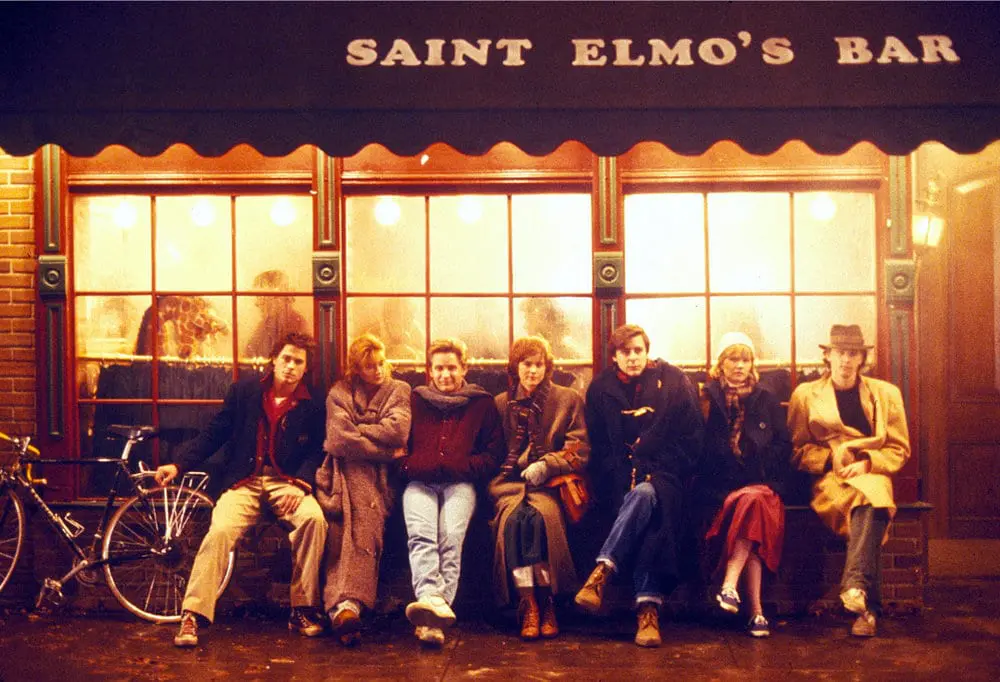
HOW IT CAME TO BE
Joel Schumacher conceived the idea while eating by himself. "While I was making my second movie, D.C. Cab, I was staying in Georgetown. One weekend, I was sitting at an outdoor café alone. It was the early ’80s, and Georgetown was like a little village of yuppies. It was the height of Reaganomics," Schumacher told EW. "The heroes were Donald Trump and Michael Milken and Leona Helmsley. The attitude became ”I’m rich, f— you.” And all of these kids were coming out of universities with 20-year plans. I felt sorry for them. I was listening to their conversations and I thought, 'What must it be like to be spit out of these universities, thinking ‘I better make a lot of money’?” No one had done a movie about yuppies yet, and no one had really made a movie about a graduate since The Graduate.
Carl Kurlander had the right job at the right time. "I started writing a story about a group of friends who graduated at that moment. But what did I know? I never went to college. I got an intern from Duke University named Carl Kurlander, and we wrote St. Elmo’s Fire together on spec," Schumacher said. "We sent it out to everybody, and people were shocked. The head of Universal Pictures actually called me into his office and said, ”You have single-handedly come up with the seven most loathsome human beings ever created!” But there were two young guys at Columbia Pictures who got it."
What’s up with the title St. Elmo’s Fire? Billy comforts Jules by telling her that her financial crisis is “not real” (um, it is), saying, “It's St. Elmo's Fire. Electric flashes of light that appear in dark skies out of nowhere. Sailors would guide entire journeys by it, but the joke was on them... there was no fire. There wasn't even a St. Elmo. They made it up. They made it up because they thought they needed it to keep them going when times got tough, just like you're making up all of this. We're all going through this. It's our time at the edge.” The dialogue was inserted to make the title come full circle and relate to the characters beyond the name of the bar they frequent.
Billy's speech was written in to ensure the movie's title. Joel Schumacher was told repeatedly that no one would go see a movie titled St. Elmo's Fire -- so he needed a piece of dialogue so it made sense. “[Schumacher] pointed out that the studio might change the name of the film, so I had to make St. Elmo’s fire part of the plot,” Carl Kurlander said. “If I’d been able to do Internet research back then, it might have been called something completely different!”
In fact, St. Elmo came from where screenwriter Carl Kurlander’s summer job. He wrote about his experiences working at the St. Elmo Hotel in Chappaqua, New York, where he – like Kirby – fell hard for a waitress who didn’t return his affection. Kurlander then set his characters’ favorite college hangout as St. Elmo’s Bar (based on Georgetown’s “The Tombs.” Based on his professor’s recommendation, he titled his short story “St. Elmo’s Fire.”
Joel Schumacher realized there was a void in the marketplace. Schumacher had two very modest hits The Incredible Shrinking Woman (1981) and the Mr. T vehicle (literally!) D.C. Cab (1983) when conversations with his then-assistant Kurlander helped him realize there was an audience with no movies being made for them. High school life was covered, but no one had made a movie about graduating college in some time. The screenplay they co-wrote in one month was based on both of their real life experiences.
The Reagan Era: The Movie. A conservative movement swept through the country during Ronald Reagan's eight years as president and it impacted young people - think Alex P. Keaton from Family Ties. Schumacher told EW, "I lived in Georgetown during the period of Reaganomics. I was looking at all of these kids who were acting like adults who thought they should have 25-year plans. Every studio turned down the spec script. The head of Universal actually called me into his office, threw the script down, and said, “Joel, in the history of movies, you have managed to create seven of the worst people I have ever seen on a page.” He then went off and made Howard the Duck."
What's going on with the photo in the poster? The photo of the cast isn't from the movie and doesn't look like your typical poster. The cast knew a picture was being taken but in that particular photo, the cast wasn't aware it was being shot at that moment. Rob Lowe explained, "That image of all of us huddled outside of St. Elmo’s Bar was just a quick shot we took to send to the executive who had championed the movie, Craig Baumgartner. That was a photo for him that nobody thought anything of. We all sort of looked like crap. And it ended up being the poster for the movie."
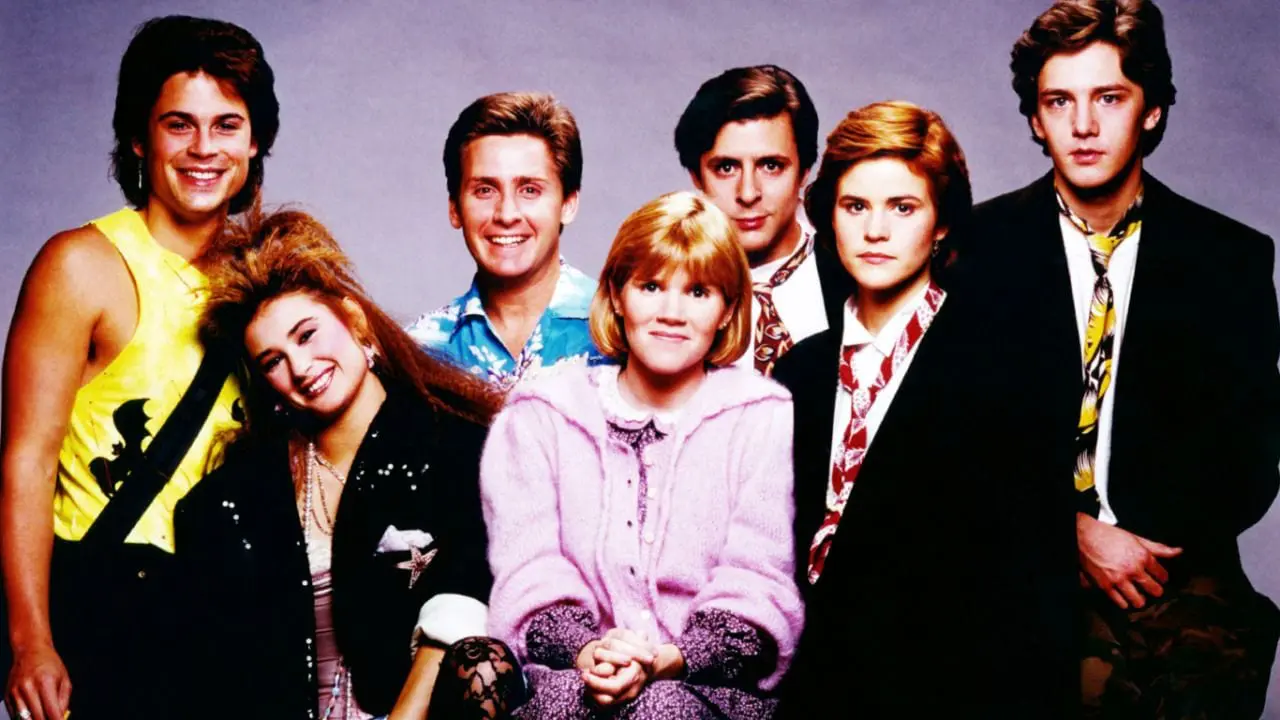
CASTING "THE BRAT PACK"
Cast "sex." Lauren Schuler Donner said she learned from Joel Schumacher that you want to cast the person the audience wants to have sex with -- and that's how they cast St. Elmo's Fire.
Half of the cast was from The Breakfast Club. The Breakfast Club was filming while St. Elmo's Fire was in pre-production. Lauren Schuler Donner was friends with John Hughes (they'd worked on Mr. Mom together) and Hughes' office was across the hall from Schumacher's. Donner said, "The Breakfast Club was a tiny little movie that no one thought would go anywhere," and so utilizing half of their actors didn't seem like it would be that noticeable. Plenty of other actors were auditioned for the roles of Leslie, Alec, and Kirby, it's just that in the end, Hughes' recommendations were perfect fits.
Imagine Meg Ryan as Leslie. Ally Sheedy was up against pretty amazing competition. Ryan (pre-Top Gun), Jamie Lee Curtis, Melanie Griffith and Elisabeth Shue were also up for the part of the architect in a love triangle. However, Schumacher said to The Washington Post, "You could not meet Ally and not fall in love with her ... She was the girl most likely to succeed."
No one was surprised Ally Sheedy was given the role of Leslie - except Ally Sheedy. Schumacher visited The Breakfast Club set to meet with the actress, where she was playing the artistic outcast Allison. On a follow up meeting with the director in downtown Chicago, Sheedy drove in from the suburbs where Hughes was filming but a car accident made her late -- really late. In the '80s, there was no way to phone from the road. When she arrived, dressed all in black as Allison, she figured it was over. However, Schumacher saw Leslie. He said in Susana Gora's book "You Couldn't Ignore Me If You Tried," "When I met her, I knew that she was Leslie; she was this beautiful, intelligent young woman -- you could see the guys having a crush on her and the women wanting to be her friend." The director added that since Sheedy had already been in a hit film, War Games, Columbia execs were thrilled with the casting choice.
The discovery of Demi Moore was also a result of John Hughes. Joel Schumacher saw a flash of Moore as she dashed through the hallway he shared with Hughes. In that glimpse, he saw Jules. It probably helped that she was moving with anger - Hughes had stood her up for their meeting. She was pissed.
Demi Moore WAS Jules. At the time, Moore had a memorable two-year stint on "General Hospital" and Blame It on Rio. Moore arrived to the audition on a motorcycle. "She was obviously a 'natural' in the truest sense of the word, with a unique sense of style that can only be described as a genuine original. Her hair was kind of a mess. She had this perfect raspy voice. She was the character. Once she walked in, we immediately hired her," Shuler Donner said.
Diane Lane and Matthew Broderick refused official offers to be a part of the cast. Schumacher said they were the only two they wanted that he didn't get. Others up for consideration include Lea Thompson (Jules), MIndy Cohn (Wendy) and Anthony Edwards.
Rob Lowe says Joel Schumacher did not want him in the movie. The studio did and was somewhat insistent. Schumacher wanted Lowe as Alec, not Billy. However, Lowe sparked to the role of the womanizing, eternal frat boy and showed up to his third audition late, intentionally hung over, and carrying a six-pack. He won the role, but it came at a cost. In his book, “Stories I Only Tell My Friends,” Lowe said he became Billy, and with all the praise he received, after shooting concluded, he moved forward with the Billy persona. “I sink my teeth into Billy Hicks, the lady-killing, rockin’-and-rollin’ funmeister, and never look back. For so many years I was the nerd, the last picked for sports teams, the acting freak, the one who couldn’t get the girls’ attention. Now I have the part of the guy I could never be, no matter how hard I tried, and people love me in it. So I run with it. For a long time.”
Emilio Estevez and Judd Nelson both wanted to play Billy - and Nelson says Schumacher tricked him into taking the part of Alec instead. "There was a bigger role that Rob [Lowe] was already set to play, so the role they wanted me to audition for was Alec," said Nelson to AV Club, stating he wasn't sure at that time if he wanted to even be in the movie. "Joel Schumacher… this is back in the days when you could trick me with things like this. He goes, “Don’t you think you can play it?” And I go, “Okaaaaay.” So then I did it for all the wrong reasons but I don’t think I would fall for that again. Who knows. I might."
Andrew McCarthy blew his callback. Columbia flew McCarthy in for their meeting, putting him up at the legendary Hollywood Hotel, Chateau Marmont, and had a limousine take him to his audition. McCarthy said he didn't really know what to do at the meeting, so he just sat on the couch and "didn't impress." Afterward, Schumacher's assistant drove him back in his Volkswagon, and McCarthy confessed he really wanted the role of Kevin, The director called him the next day and told him he didn't act like he wanted the part, but got him another meeting with the execs. "I always remember that I was driven to this opportunity in a stretch limo and driven back in a Volkswagon Bug," McCarthy said to Gora.
Studio execs were most excited about putting Mare Winningham into the mix. The actress had a lot of heat, fresh from the miniseries everyone watched, The Thorn Birds. However, she was very thin - different from the way Wendy Beamish was written, so Schumacher changed the role for her. Winningham became pregnant before filming started and he then put all the references to her being plump back in.
Columbia pushed back hardest on Andie MacDowell. The model just came off her first acting role as Jane in Greystoke: The Legend of Tarzan. Her Southern voice was completely scrubbed and replaced by Glenn Close, and critics unmercifully shredded MacDowell to pieces. Schumacher fought for her and gave her the chance at redemption.
Most of the cast had worked together before. Besides The Breakfast Club (with Emilio Estevez, Judd Nelson and Ally Sheedy), Andrew McCarthy and Rob Lowe were in Class, and Lowe and Sheedy co-starred in Oxford Blues. Additionally, Lowe and Estevez were great friends going back to middle school who had previously co-starred in The Outsiders. Demi Moore told "Entertainment Tonight," "I'm sort of the baby, the real newcomer. Everybody seems to have worked with everyone. I'm the only one whose new to everyone."
Several of the actors believe the casting worked because each played an extension or a version of themselves. McCarthy said about playing Washington Post reporter Kevin, "It just suited me. It had a detachment, it had a sensitivity, with a 'rotten before its ripe' cynicism that was covering a thinly veiled, massive vulnerability. And it was intelligent. I was that boy at that time.
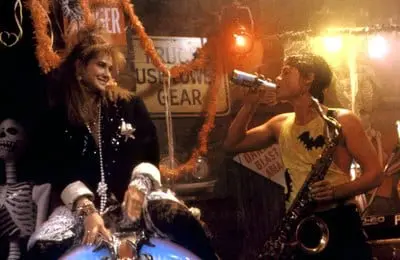
WHAT REALLY HAPPENED
Demi Moore had to go to rehab for a drug problem before playing Jules, who has a drug problem. Joel Schumacher has said he had a drug habit which he kicked in 1970. He recognized that Moore's drug issues were becoming a problem and they hadn't even started filming. The director told her she needed to get clean. "I didn’t want to give her any money that might support her demise. I felt like I had to do what was moral, so I fired her before we started shooting. She fixed the problem quickly, and it stayed fixed," said Schumacher. The irony is that Moore's character snorts cocaine throughout the film.
Moore only got through rehab because of her professionalism. In her autobiography, Moore wrote that Schumacher came into her fitting room and said, "If I hear of you having even one beer, you're fired." Later, a producer on the film who was close to Moore told her to show up to a rehab facility in Redondo Beach, that it was all set up for her. On her first day, she balked at the 30-day program because the film was to shoot in 16 days. Schumacher and two producers came to the facility, met with the administrators and created a 15-day program just for Moore. She had to have a drug counselor with her at all times on the set.
Rob Lowe met Demi Moore in the audition and started dating before they were even cast. That said, Lowe still was in a relationship with longtime girlfriend Melissa Gilbert; while promoting Youngblood, Joan Rivers roasted him while filling in for Johnny Carson on The Tonight Show for taking "a beautiful girl" out to a very public restaurant when he was known to be dating Gilbert. Lowe tried to explain that she was an actress in his next film (**cough cough** Moore). Once filming began, Moore's attention shifted to Emilio Estevez.
Demi Moore claims Rob Lowe overstated their relationship. In Moore's autobiography "Inside Out," she writes, "Rob suggests that we had some kind of hot-and-heavy romance; I can vaguely recall one ill-advised late night together, but I'm grateful for the complimentary descriptions of our youth."
Lowe learned to play the saxophone while hanging with Patrick Swayze. During his lunch breaks while filming Youngblood, Lowe said he’d be in full hockey gear with a sax around his neck.
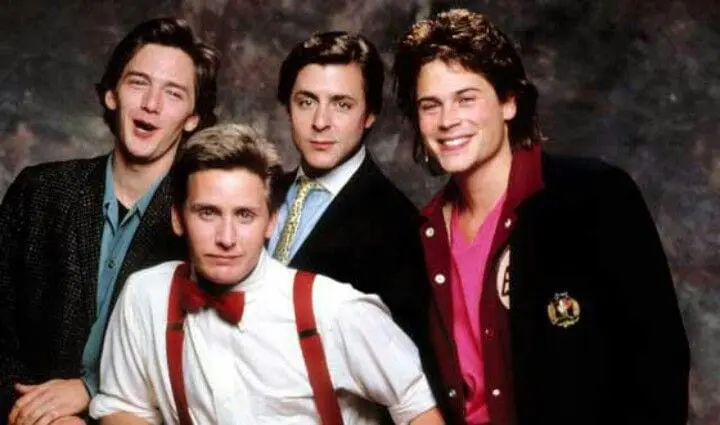
FUN FACTS
The group's catchphrase was a reference to wealthy foreigners in night clubs. “It was to Joel’s credit that we included the infamous “Boogala boogala boogala, ha ha ha,” Rob Lowe said. “Emilio, Judd, and I would go out together carousing, and we were always so pissed off about how there would be really rich foreign guys off in the corner, stealing the girls we were interested in. They would huddle together and talk, like “Buggala buggala buggala, ha ha ha.” It was an inside-joke moment that made sense only to us.
A scene where Rob Lowe’s voice is “thrashed out” had to do with The Boss. After trying unsuccessfully to meet Bruce Springsteen in Toronto, the opportunity arose one night in Los Angeles – Lowe and girlfriend Melissa Gilbert hung out with the rocker until the early hours and Lowe showed up on set the next day with not much of a voice. “I knew if I were being totally responsible, I should go home. I should not stay with Bruce Springsteen and talk with him. But there’s no way I was going to walk out of that room!” Lowe said.
Mare Winningham’s weight seems odd – she doesn’t’ seem to truly have an issue with weight as her character describes. Is she wearing a fat suit? Thick sweaters? All of the above, not to mention, in real life, Winningham was pregnant during filming.
That shower door sex mishap in the Kevin-Leslie shower scene? It really happened. Ally Sheedy said, “That’s my real laugh!”
WE NEED TO TALK ABOUT...
Suicide by Air Conditioning. Rob Lowe used that description to roll his eyes at how Jules tries to end it all. How exactly does Jules think she's going to kill herself by leaving the windows open? Jules sits in an empty room in some sort of flimsy gown with cold air blowing in. Demi Moore recently said she finds that scene "cringeworthy." Joel Schumacher responded by saying, "That part was satirical and tongue-in-cheek. [Jules is] s so fucking dramatic all the time. Demi did it fantastically, but it was ridiculous. Do you know how long it takes to freeze herself in a Georgetown apartment? She's not in the Antarctic."
Jules emotional red flag may be ridiculous but it is authentic. Writer Carl Kurlander said it was something he attempted to do at some moment when he was feeling overwrought.
Alec seems like the responsible leader of the group, but is he a good guy? Alec pressures Leslie to marry him despite the fact he's stepping out on her constantly. Judd Nelson sees the former Young Democrats president turned opportunist Republican as the opposite of his Breakfast Club character John Bender in a deeper way than you might expect. "[Alec] is from the right side of the tracks but I don't think that guy knows the difference between right and wrong. He is looking out for himself," Nelson told Susannah Gora. "Bender is from the wrong side of the tracks, but he absolutely knows the difference between right and wrong."
Ally Sheedy felt somewhat traumatized by having to do the sex scene. Sheedy wasn't expecting to have to do a sex scene on camera; her impression from the script was that they'd cut away. She didn't want to do it. “I remember doing the love scene with Ally Sheedy, and we were fairly tender and shy as actors to be doing this sort of thing. Joel [wanted us to be more wild and] in his inimitable style screamed, “You’re f—ing!” Ally burst into tears, and in that instant, I stood up and said, “What the f— is a matter with you, Joel?” McCarthy said in a retrospective interview. Schumacher has since said that he "made a terrible mistake" in the way he treated her on set and is embarassed by his behavior. Sheedy eventually left Hollywood, primarily she has said because she felt it wasn't right that women have to be made into sexual objects for film.
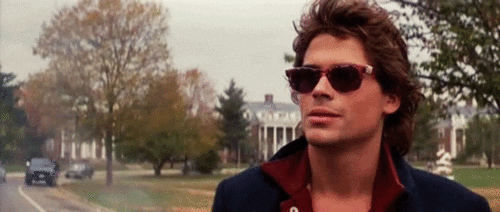
GEORGETOWN
Georgetown refused to have anything to do with St. Elmo’s Fire. The friends clearly just graduated from Georgetown University, but the school worried how it would reflect on their institution. Joel Schumacher thought it was a little late for that, but he was quickly corrected. "We weren’t allowed to shoot at Georgetown because the Jesuit fathers said they couldn’t condone premarital sex. I met with one of them, thinking about The Exorcist, which was shot there, and said, 'Wasn’t there a movie shot here where a prepubescent masturbated with a crucifix and said, ‘Your mother sucks c–ks in hell’?' He smiled and said, 'That is true, Mr. Schumacher, but in that particular film God wins over the devil, which does not seem to be the case in St. Elmo’s Fire.'"
University of Maryland gets the glory. “Nothing was shot at Georgetown. The university wouldn’t let us because they thought the movie would be bad for their reputation,” Rob Lowe told EW. “I love that 30 years later we are talking about the movie, and Georgetown is dealing with their legacy of slaves building their university. So much for that idea! University of Maryland let us shoot instead."
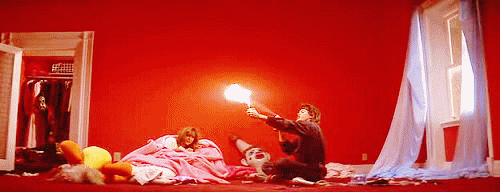
REVIEWS
Movie critics compared the film as an ensemble film that, age wise, fit right in between The Big Chill and The Breakfast Club. It has two stars currently on Rotten Tomatoes and Metacritic.
Gene Siskel: "Yucky." The Chicago Tribune critic wrote, "Barely has there been a group of more smug and obnoxious characters in a single film than in St. Elmo's Fire."
The Washington Post's Paul Attanasio wrote, "These aren't characters - they're character hooks." "St. Elmo's Fire is about people who go to lunch and feel nostalgic for breakfast. The latest kiddie angst movie, it's thin gruel for introspective whelps." While many other critics celebrated all of the performances, particularly Rob Lowe's, Attanasio saw it much differently: "Nelson, on the other hand, is overstated and actorish as usual -- all pout and strut, his face contorting around what seems to be a sea anemone but purports to be his nose. He's supposed to be supercompetent, but he's not even in control of his own face. And if I never see another movie with Rob Lowe mooning over his own girlish looks it'll be too soon.
The New York Times noted it "is most appealing when it simply gives the actors a chance to flirt with the camera, and with one another." "St. Elmo's Fire is as good a film as any to put into a time capsule this year - to show what and whom young viewers want, and how eager Hollywood is to give it to them."
The Hollywood Reporter didn't have much of a comment on the film, narrowing their critical opinion down to one line: "Performances under Joel Schumacher's intelligent direction are spirited and on-the-mark."
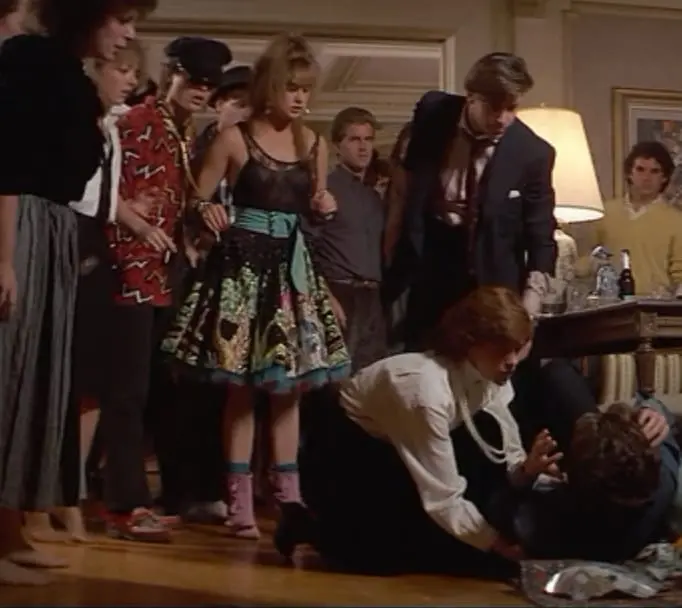
LEGACY
This is the movie that spawned the label “the Brat Pack.” New York Magazine was doing a story on Emilio Estevez’ prodigious move into directing at such a young age. Estevez wanted to show the reporter he wasn’t so serious and invited him to a thank you dinner at the Hard Rock Café, inviting his St. Elmo’s Fire castmates, Judd Nelson and Rob Lowe. Drinks and women were aplenty. The Brat Pack became the focus of the article and slapped a label on all young actors of the ‘80s they felt they unfairly earned and couldn’t escape.
The Brat Pack moniker was the death knell to the rocket that had been their careers. The new kid - Demi Moore - saw her opportunities soar. The rest began stagnating – they believe due to being seen as entitled kids.
Rob Lowe had plans for an Oscar. In interviews for St. Elmo's Fire, Rob Lowe talks about his new production company and how the film sent him into "Phase 2" of his career where he would be making his own films to take on more serious material so he could "go after the golden ring; that never materialized.
Andrew McCarthy succeeded in two more youth roles. Blane in Pretty in Pink and Clay in Less Than Zero, but became a punchline with successful but preposterous films Mannequin and Weekend at Bernie's. He worked consistently but by the early '90s, his leading man movie career fizzled. He is now a successful episodic TV director.
Emilio Estevez finally did get to play "Billy the Kid." While the role of Billy Hicks was the one that got away, Estevez took on William Bonney - aka Billy the Kid - in Young Guns and its sequel. He also embraced family films with The Mighty Ducks franchise as he turned more to directing small, independent films.
Mare Winningham returned to the place she thrived: TV movies. The singer actress came from the Movie of the Week world and returned, while also getting supporting roles in forgettable films.
Judd Nelson and Ally Sheedy struggled the most. Nelson and Sheedy reteamed for a third time with Blue City which made no impact.
Andie MacDowell didn't take off immediately, but eventually she did. The opportunity to show she could act turned her life around. It led to her role in Sex, Lies, and Videotape I1989), the Steven Soderberg film that made her an in-demand actress.
The Brat Pack didn’t just kill careers, it killed friendships. “[Filming St. Elmo’s Fire and The Breakfast Club] was the first time I ever belonged anywhere,” Ally Sheedy told New York Magazine of the friendships that bloomed from filming. She said the embarrassment of the Brat Pack term led the group to stop hanging out together. "It exploded and I felt robbed of my friends. I’m not in touch with those people anymore.”
Would there be a "Friends" if there wasn't a St. Elmo's Fire? The film is about a group of friends struggling to figure out who they are, what career path they should be on, and who they should be dating...which sounds like another large dual gender friend group who frequent a coffee shop. Perhaps "Friends" is the response to St. Elmo's Fire - the film makes it clear the buddies are drifting apart, but "Friends" is forever.
NBC is considering a TV series reboot. They've ordered a pilot of a modern day version of the friendship classic -- and the internet went wild. ABC went down this road in 2009 with Topher Grace as a star and EP, but it never made it to air.
Soundtrack
St. Elmo's Fire put music producer David Foster in the soundtrack business and helped to make him a household name. John Parr's "Man in Motion" (which was written, recorded, and edited in 24 hours) held No. 1 on Billboard for three weeks. Foster's own "Love Theme from St. Elmo's Fire" hit No. 15 and got play on adult contemporary stations for all of eternity.
"Stressed Out (Close to the Edge)" by Airplay
Director: Joel Schumacher
Screenwriter: Joel Schumacher, Carl Kurlander
Release Date: June 28, 1985
Rating: R
Opening Weekend Rank: #4. At #1 was new release Pale Rider. Cocoon was #2, Rambo: First Blood II was #3.
Opening Weekend Box Office: $6.1 million
Lifetime Gross: $37.8 million
Budget: $10 million
Production Company: Columbia Pictures
Distributor: Columbia Pictures

